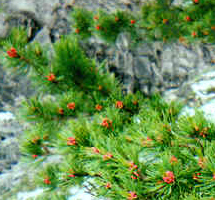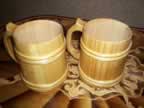 The Siberian 'Cedar' (also known in the West as the Siberian pine) is one of the most beautiful and majestic trees on the Earth. Ever since the very earliest times it has been considered a life-giving, healing tree. Cedar wood excretes phytoncids, which destroy disease-inducing micro-organisms and serve to purify the air with healing and healthful properties. In the Old Testament (Leviticus 14: 4) God teaches how to heal people and even disinfect dwellings with the help of... the Cedar.
The Siberian 'Cedar' (also known in the West as the Siberian pine) is one of the most beautiful and majestic trees on the Earth. Ever since the very earliest times it has been considered a life-giving, healing tree. Cedar wood excretes phytoncids, which destroy disease-inducing micro-organisms and serve to purify the air with healing and healthful properties. In the Old Testament (Leviticus 14: 4) God teaches how to heal people and even disinfect dwellings with the help of... the Cedar.
Scientists note that Cedar-panelled rooms are practically bacteria-free, down to 200-300 bacterial cells per cubic metre. It should be pointed out that according to medical standards, even in operating rooms a level of 500-1000 non-pathogenic microbes per cubic metre is permitted.
 Cedar walls emit positive energy. In Cedar houses the air is always clean.
Cedar walls emit positive energy. In Cedar houses the air is always clean.
Siberian Cedar timber has a beautiful composition, with a lovely rosy colour. The noble colour of this sacred tree delights one's eyes and cheers one's mood year after year. Cedar timber is resilient against decay, and is hardly ever subject to canker-worm.
The cedar tree and the cedar nut oil have a special spirit and influence. They eliminate tension, increases bodily immunity, and facilitates rapid health recovery after a difficult disease or operation.
The Siberian Cedar is the beauty and national pride of Russia.
 Residents of Siberia use Cedar wood in their everyday lives. Carpenters lay down Cedar floorboards in peasant huts, which are both beautiful to look at and warm to the touch. The Cedar's resinous wood wards off all sorts of bugs, and thus has been used from the very earliest times to make furniture, including trunks, wardrobes, cupboards and dressing tables. Cedar furniture is never troubled by moths, but even when dresser drawers or trunks were made of other kinds of wood, they would invariably place cedar cones in them. Just like the wood, Cedar cones ward off bugs with their scent.
Residents of Siberia use Cedar wood in their everyday lives. Carpenters lay down Cedar floorboards in peasant huts, which are both beautiful to look at and warm to the touch. The Cedar's resinous wood wards off all sorts of bugs, and thus has been used from the very earliest times to make furniture, including trunks, wardrobes, cupboards and dressing tables. Cedar furniture is never troubled by moths, but even when dresser drawers or trunks were made of other kinds of wood, they would invariably place cedar cones in them. Just like the wood, Cedar cones ward off bugs with their scent.
 Peasants in certain regions believed the Cedar wood killed harmful microbes. And so they preferred to make the bottom and lid of birch-bark cylinders out of Cedar. In Western Europe cedar wood was used in the manufacture of milk jugs. The craftsmen claimed that milk kept in such a jug would last a long time before spoiling and would take on a pleasant flavour.
Peasants in certain regions believed the Cedar wood killed harmful microbes. And so they preferred to make the bottom and lid of birch-bark cylinders out of Cedar. In Western Europe cedar wood was used in the manufacture of milk jugs. The craftsmen claimed that milk kept in such a jug would last a long time before spoiling and would take on a pleasant flavour.
All products made from Cedar possess a powerful beneficial energy.
A. B. Krivosheev
Professor of the Department of Internal Medicine
Doctor of Medical Sciences





